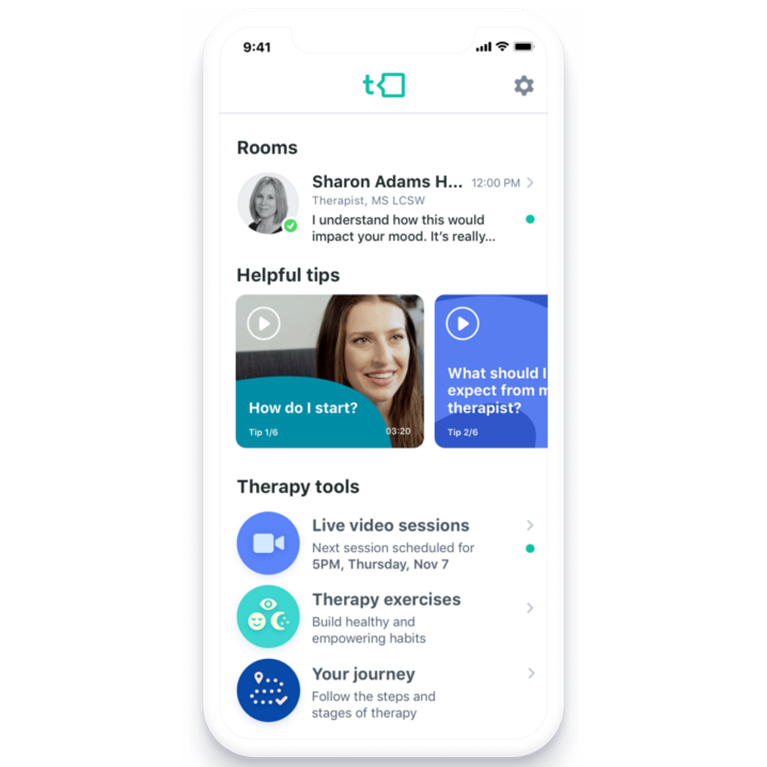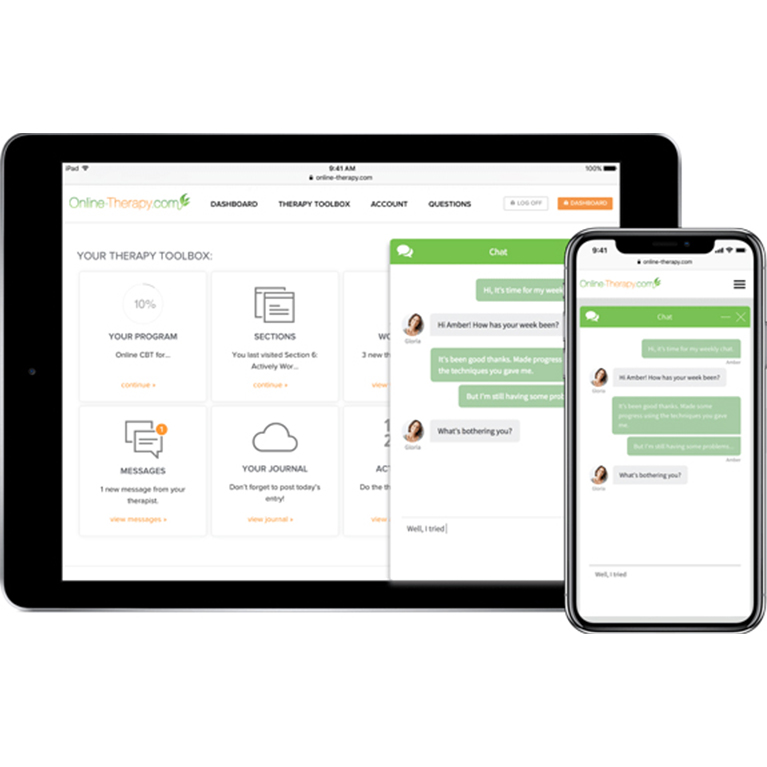It’s clear the United States is suffering from a significant shortage of mental health professionals, particularly in rural areas. (1) In fact, one 2022 report found that 47% of the U.S. population was living in a mental health workforce shortage area. (2) Meanwhile, another report found that 25 million people live in areas that have a mental health professional shortage and cannot access care when they need it. (1)
“When we’re unable to get the help we need to take care of our mental health, the impact can be detrimental,” says Geralyn Dexter, PhD, LMHC, a licensed mental health counselor. “We may see new or worsening symptoms. We can find ourselves feeling ashamed, isolated, and even turning to unhealthy ways of coping. In some cases, our psychological state can become so severe that we find ourselves in crisis. Access to care is critical. Everyone deserves access to quality and prompt mental health care.”
That’s where online therapy providers like BetterHelp come in. It’s designed to bridge that gap by offering therapy in every state in the U.S. If you live in a therapy desert or a community without access to mental health services, you may be wondering if an online therapy provider is the right solution for you. In our review of BetterHelp, we explore the pros and cons, how the platform works, how much it costs, whether it accepts insurance and much more to give you the insight you need


Key product features
What you should know
BetterHelp is an online therapy provider with nearly 34,000 therapists available to address people’s needs. It gives those with limited access to mental health services the opportunity to connect with well-educated, credentialed, and knowledgeable therapists virtually.
- People who get therapy from BetterHelp have the option to use a nickname and can choose from video, audio, or chat sessions with their therapist.
- BetterHelp doesn’t accept Medicare, Medicaid, or insurance, so its services tend to be pricier, at $280 to $400 per month, but it does offer financial assistance to those who qualify.
- Because BetterHelp is located in every state in the U.S., it’s ideal for people who do not have access to therapists in their area; it’s also a good option for people who need flexible scheduling.
- The BetterHelp subscription not only includes weekly therapy sessions but also free group sessions and the ability to message your therapist at any time.
What is BetterHelp?
BetterHelp is an extensive online therapy service designed to make mental health care accessible and convenient. Not only can people with little access to therapy in their community find quality mental health services, but they also have the flexibility to choose video, audio, or chat (live or asynchronous) when communicating with their therapist.
We also appreciate that you can use a nickname on the platform, as the questionnaire BetterHelp uses for signing up and matching you with a therapist does not require you to use your real name. This option can make therapy more welcoming and less intimidating for those whose reluctance keeps them from reaching out for help. (3)
Plus, BetterHelp therapists offer a broad range of therapies, including cognitive behavioral therapy (CBT), dialectical behavior therapy (DBT), mindfulness-based cognitive therapy (MBCT), and more, so people are sure to find the type of intervention they need.
We also like that the company offers worksheets and free group sessions to complement the therapy experience. This type of homework and peer interaction can deepen the learning process and provide additional support when needed. What’s more, subscribers can message their therapist between sessions if they have a question or need extra support.
With costs ranging from $70 to $100 per week (or $280 to $400 per month), BetterHelp can be somewhat pricey for some, especially since it does not accept insurance. However, the company does have financial aid options available for those who qualify. We just wish the mental health services included providing diagnoses, medication management, and crisis help.
If you’re looking for a more budget-friendly platform, check out our best affordable online therapy services.
What our experts say
Dexter states, “Starting therapy is a big step. The process of looking for a therapist can be overwhelming and time-consuming, especially if you need help figuring out where to start or what’s available in your community. BetterHelp has a large selection of qualified providers, taking some of the stress out of getting the help you need.
“Reviewing a therapist’s profile gives you a sense of their education, experience, and expertise. Many therapists also write about their philosophy for working with clients on their profiles, which helps you learn a little about their approach and style.
“In therapy, it’s important to work with someone qualified to address any concerns you have and with whom you can develop a trusting therapeutic relationship. Though you aren’t able to ‘meet’ your therapist before matching, it doesn’t mean you can’t spend some time asking them questions and sharing your goals and needs. One of the great things about BetterHelp is that if you are matched with someone who doesn’t feel like the best fit, you can request to change counselors.”
What customers are saying
The majority of people who have used BetterHelp report having a good experience. In fact, the Better Business Bureau (BBB) indicates that BetterHelp’s reviews have an average of 4.02 out of 5 stars from 580 customer reviews. Additionally, it has an A rating from the BBB. This rating is assigned by the organization based on the company’s trustworthiness but is not a guarantee of the company’s reliability. (4) Meanwhile, the “trust score” for BetterHelp on Trustpilot is 4.4 out of 5 stars from 7,880 reviews. (5)
These high reviews are largely based on the quality of therapy people have received from BetterHelp. People also appreciate the platform and the fact that they can get the help they need without the discomfort of sitting in a therapist’s office. For instance, Kayla M., a verified Trustpilot reviewer, says that “BetterHelp took the scary out of therapy for her.”
“My therapist has already helped me to understand myself better, challenge myself, set goals for myself, and make me not feel bad about myself for having bad days. BetterHelp has made therapy as flexible and easy as possible for me.”
Kayla M., verified Trustpilot reviewer
Ashley B., another verified Trustpilot reviewer, appreciates BetterHelp’s discreetness and ease of attending therapy sessions. “Talking to a stranger about your secrets and fears is terrifying. This app takes away so much of that fear. As someone who doesn’t do well with face-to-face therapy, this gives me the chance to open up without someone staring at me.”
The most common complaint about BetterHelp concerns its scheduling and costs per session. The subscription is for a month, but the price is communicated as a cost per week, causing many BetterHelp users to assume that they will receive four sessions a month or not be charged. However, due to scheduling conflicts, some people only get in about two to three sessions a month rather than four. When this happens, the cost of therapy with BetterHelp is even higher.
Jin, a verified Trustpilot reviewer, notes: “I like my therapist, group coaching sessions, and classes. Unfortunately, there’s no flexibility in booking sessions. If I missed a session last week, I can’t book two this week. With my work schedule, sometimes I cannot have sessions some weeks and end up just losing sessions, which makes membership very expensive.”
Specs
| Session type | Individual |
| Price | $70-$100 per week or $280-$400 monthly |
| Accepts insurance | No |
| Prescribes medication | No |
| Messaging | Yes |
| Mobile accessibility | Yes |
| Therapy options | Video, audio, chat |
Our BetterHelp experience
During my review of BetterHelp, I started by filling out the online questionnaire so that I could get matched with a therapist. Overall, the questions were thorough and covered various topics about my gender identity, age, sexual orientation, and relationship status. It also asked about my mental health history, including my mood and my expectations for a therapist.
From there, I was given the price for therapy, which was $90 per week or $360 a month for a therapist in Ohio. This amount was a little high for online therapy, so I exited out of the system without finishing the signup process. Until then, I didn’t know what therapy with BetterHelp would cost because it’s not revealed until you complete the questionnaire.
Before exiting the system, BetterHelp did ask why I decided not to sign up, and I indicated that the price of the therapy was my number one reason. Even though I didn’t sign up for therapy with BetterHelp, I still received a match for a therapist within a day or so. My proposed therapist had more than 10 years of experience and an impressive resume.
A few days later, I received another email from BetterHelp noting that it could offer me therapy for $70 per week or $280 per month. I was pleasantly surprised by this price reduction and felt that it was more than appropriate for weekly online therapy. However, I still decided not to sign up at that point.
BetterHelp continued to reach out with emails and reminders before sending a final email that the price adjustment was about to expire. I also received another therapist match, which I researched online as well. I am assuming the company did this in case I didn’t like my first therapist match.
This therapist was also experienced. But I think the first match would have been a better fit for me if I had signed up. This gave me confidence that BetterHelp does a good job of matching prospective clients with therapists.
That said, being assigned to the new therapist, though qualified, reduced my likelihood of signing up with BetterHelp. Based on my questionnaire, I think the first match was a better fit, and I was somewhat disappointed by the change. Down the road, if I choose to sign up for therapy with BetterHelp, it will be interesting to see if I can get matched with the first therapist I was matched with.
How we test online therapy
During our review process, we evaluated the accessibility and convenience of BetterHelp as well as the credentials of the therapists on the platform. We also considered the cost, value, support, and resources, as well as their privacy and security policies.
Therapist quality—30%
A top-notch teletherapy service should feel both personal and professional, not impersonal or generic. It should connect users with certified and experienced therapists, not unqualified individuals. Here’s what we look for:
- Expertise
- Personalization
- Interaction quality
Accessibility and convenience—30%
Teletherapy directly impacts an individual’s ability to seek, engage with, and benefit from mental health services. Whether it’s a scheduling issue, lack of transportation, or being physically unable to see a therapist in person, everyone’s situation is different. Teletherapy is here to help change that. With the convenience of teletherapy being a significant advantage, we evaluate:
- Ease of use
- Availability
- Platform reliability
Cost and value—20%
Unfortunately, mental health services are not a financial privilege for most people who don’t have insurance that covers it. In an era where mental health care is more necessary, yet often more expensive than ever, assessing the cost-effectiveness of teletherapy services becomes not just relevant but essential.
Here’s what we factor into a teletherapy’s cost and value rating:
- Pricing transparency
- Insurance and coverage
- Value for money
Support and resources—10%
Good mental health habits don’t end after each session. It’s a constant task we must continue to practice. Access to additional support and resources is invaluable for clients seeking to deepen their understanding of mental health issues, learn additional coping strategies, or continue therapeutic work in between sessions. Beyond the therapy sessions, additional support can enhance the therapeutic experience.
Our factors in this rating include:
- Supplementary materials
- Customer support
- Aftercare
Privacy and security—10%
While teletherapy is an incredibly convenient way to seek mental health, it poses some risks. Maintaining client confidentiality and data security is paramount in teletherapy. As clients entrust teletherapy services with their mental health information, stories, and vulnerabilities, the responsibility of these platforms to protect such information is paramount.
Here’s what we’re looking for:
- Compliance with HIPAA and data protection laws
- Encryption and security measures
- Anonymity options
Compare BetterHelp to other online therapy platforms

|

|

|

|

|
|
| BetterHelp | Brightside | Talkspace | Talkiatry | Online-Therapy.com | |
| Rating | |||||
| Cost | $70-$100 per week | $95-$349 per month | $69-$109 per week | Varies by insurance (does not accept self-pay) | $50-$110 per week |
| Session type | Individual | Individual | Individual, couples, teens, veterans, LGBTQIA+ | Individual | Individual, couples |
| Ages treated | 18 and older | 13 and up | 13 and up | 5 and up | 18 and older |
How does BetterHelp work?
Once you have completed the questionnaire and signed up for therapy, you will be assigned a therapist in as little as 48 hours and can start communicating with them in the portal. At that time, you can discuss scheduling your first appointments and what you hope to accomplish in therapy. After you schedule your first therapy sessions, you can get therapy in four ways: chatting live, speaking over the phone, or using video conferencing. You also have the flexibility to use different ways at different times and are not locked into one communication method. Lastly, you can complement your therapy with in-app messaging, worksheets, and free group sessions.
Who is BetterHelp right for?
There are a number of people who could benefit from therapy at BetterHelp, including those with limited access to mental health services in their communities. People who are unable or reluctant to meet a therapist in person or those who lack transportation may also appreciate the convenience and ease of use of an online therapy option. BetterHelp also is a good option for those dealing with common mental health issues like stress, anxiety, depression, and relationship challenges. (6)
Who should seek an alternative to BetterHelp
BetterHelp may not be the right option for people with a mental health condition that needs an official diagnosis or medication management or those who have to fulfill a court order as it doesn’t provide these services. It also may not be ideal for those who find it difficult to navigate technology or those who do better with in-person communication. Likewise, minors, people in crisis, and people with severe mental health issues should look for a therapy option that meets their specific needs.
Does BetterHelp prescribe medication?
Medication for mental health conditions is usually prescribed by a psychiatrist who has a medical degree, and BetterHelp does not have any psychiatrists working with the organization. Consequently, Betterhelp is unable to prescribe medications or offer any type of medication management.
If you are interested in seeing a psychiatrist, check out our best online psychiatrist services.
Can I receive a mental health diagnosis through BetterHelp?
BetterHelp is not equipped to provide mental health diagnoses, medication management, or fulfill court orders. However, it can provide talk therapy, counseling, group sessions, and complementary worksheets. People who need couples therapy or teen counseling can visit BetterHelp’s sister sites, Regain and Teen Counseling.
Types of plans offered by BetterHelp
BetterHelp offers a monthly subscription plan for therapy. Even though you are given a weekly rate of anywhere from $70 to $100 per week, your credit card or PayPal account is billed monthly. During that time, you can meet virtually with your therapist through video, phone, or chat once a week. You also have the option to message your therapist in between sessions and attend group sessions.
BetterHelp pricing
BetterHelp subscriptions range from $70 to $100 per week (billed every four weeks), so the monthly costs can range between $260 and $400 depending on the fee BetterHelp assigns to you when you sign up. The cost of online therapy through BetterHelp is determined based on therapist availability and your location. Some states are more expensive than others.
How therapists are onboarded
BetterHelp therapists are independent contractors for the organization who have filled out an application on the company’s website. To become a therapist for BetterHelp, applicants need to have a valid license to provide clinical therapy issued by a state board and three or more years of experience in therapy. Therapists may demonstrate their competency by responding to clinical vignettes. They also need to reside in the United States and have a computer with reliable internet access. Those who are interns or require supervision to provide therapy cannot be a provider at BetterHelp.
How many therapists are on the platform?
At the time of publication, BetterHelp’s website indicates that it has nearly 34,000 therapists providing mental health therapy through its platform. Those who provide therapy are independent contractors and not employees of the company.
Onboarding new users
If you decide BetterHelp is the right online therapy provider for you, simply go to the website and fill out the questionnaire. Once you have submitted your answers, you will be matched with a therapist and given access to the platform’s portal. Once matched, you can also start communicating with your therapist right away and schedule your first appointments. You will also be given some general information about the site and how to make the most of your therapy including utilizing additional features like free group therapy, worksheets, and unlimited messaging.
How are new users matched with a therapist?
BetterHelp provides an extensive questionnaire with questions covering a wide variety of topics. It asks about your gender identity, age, sexual orientation, and relationship status. It also asks about your mental health history, including your mood and expectations for a therapist. Then, the platform uses this information to match you with a therapist that aligns with your needs and expectations. Once matched, people can change therapists with a request through the portal if the match is not a good fit.
How to choose the therapy platform for you
While research shows that online therapy is effective, it’s still important to research and ensure the online therapy platform you choose is right for you. (7) Here are a few things to consider before purchasing an online therapy provider subscription.
- Price and insurance: Pricing for online therapy varies significantly. Some online therapy platforms accept insurance, while others do not. Some offer a sliding fee scale or financial aid. Find out the cost of the service before signing up, including whether your insurance will cover it.
- Scheduling: Online therapy providers tend to offer more flexibility regarding scheduling. If you have limited time for therapy, you want to ensure that the platform meets your needs before signing up and that appointments are available at the most convenient times.
- Location: When using online therapy, the therapist you use must be licensed in the state you’re located in, even when using the internet. First, ensure the online therapy provider offers therapy in your state. (8)
- Method of communication: Different platforms offer different ways of communicating with your therapist, such as live chat, text messaging, phone calls, and video conferencing. If you prefer one method over another, ensure it’s an option before signing up.
- Cancellation policies: Before committing to online therapy, find out how to cancel your subscription and how the company handles refunds. This way, if you decide to terminate your agreement, you will know what to expect. Also, find out how far in advance you must reschedule or cancel a therapist appointment and whether you will still be charged for it if you cancel the day of.
- Extra features: If you think additional features, such as unlimited messaging, group therapy, worksheets, or videos, would help you get the most out of therapy, make sure the therapy provider you’re considering offers them.
We’ve Featured BetterHelp in:
- Best Mental Health Apps
- Best Anxiety Apps
- Best Online Therapy Platforms that take Insurance
- Best Online Therapy Services
- Best Online Anger Management Services
- Best Affordable Online Therapy Options
- Best Online Therapy Platforms for ADHD
- Best Online Therapy Platforms for Depression
FAQs
Is BetterHelp legit?
BetterHelp is a legitimate online therapy platform that connects people to licensed mental health professionals through the internet. The company’s therapists offer therapy for a range of issues like depression, anxiety, and stress and provide flexible communication options. But BetterHelp has faced some scrutiny in recent years, especially after a controversy concerning privacy and data handling practices. These allegations were addressed by the Federal Trade Commission (FTC), which ruled that the company had engaged in deceptive data collection. In response, BetterHelp settled with the FTC for $7.8 million. (9)
Does BetterHelp take insurance?
BetterHelp does not accept insurance primarily because the company cannot submit claims to Medicare, Medicaid, or any health insurance plan. The company explains that this is due to several reasons, including: (10)
- The legal complexity of offering therapy online
- Varying patient locations and costs
- BetterHelp’s inability to offer diagnoses
- The therapists working as independent contractors
If you have health insurance, you may be able to submit a portion of your BetterHelp therapy costs to your insurance company for reimbursement. But you should contact your provider to see if that’s a possibility to find out for sure. You also can ask about the possibility of using your health savings account (HSA) or flexible spending account (FSA) to cover the costs.
Is BetterHelp worth it?
When it comes to therapy, there is a good chance that you will benefit from it, especially since research shows that 75% of people who enter psychotherapy show some benefit. (11) But knowing whether or not you should try BetterHelp will depend on your therapy goals and what you need help with. Your budget and schedule also will be a factor in determining if BetterHelp is worth it.
For instance, if you have health insurance that covers mental health at 100%, BetterHelp may not be a good option for you because it doesn’t accept insurance, and you could potentially get therapy at no cost somewhere else. Conversely, if the only time you have available is late in the evening, you might prefer the flexibility of an online therapy provider like BetterHelp. In the end, only you can decide if BetterHelp is worth it or not.
Our experts
Dr. Geralyn Dexter, PhD, LMHC
Geralyn Dexter, PhD, LMHC (she/her) is a writer, editor, professor, researcher, and clinician. She received a PhD in Psychology from Northcentral University, a Master of Science in Mental Health Counseling from Nova Southeastern University, and a Bachelor of Science in Psychology from the University of Florida. Dr. Dexter has over a decade of clinical and editorial experience. She’s practiced and supervised in intensive outpatient, community-based settings, private practice, telehealth, and mental health startups. Dr. Dexter is also a qualitative researcher whose interests include suicidal ideation and behavior and non-suicidal self-injury.
Krista Manning
Krista Manning is an accomplished medical copy editor and fact-checker who stands out in the pharmaceutical, health, and wellness domains. With a meticulous eye for detail and a command of medical language, Krista ensures the accuracy and clarity of content. Beyond her professional expertise, Krista is an advocate for mental health awareness. Recognizing the crucial intersection of psychological and physical well-being, she actively contributes to projects that promote mental health awareness within the healthcare narrative. Krista’s commitment extends beyond the pages she edits, emphasizing the holistic nature of health communication.

Sherri M. Gordon, CLC
Fortune Recommends Health Writer
About Author
Sherri M. Gordon, CLC is a health writer, certified life coach, and author of more than 30 books for young readers. With more than 20 years of experience covering health and social issues, Sherri is well versed in health conditions, mental health concerns, sleep, aging, parenting, and more. Her work has been featured in Health, Parents, Verywell Health, Columbus Parent, Home Living, and more. She also has earned a Certificate of Completion from Ohio State’s Patient and Community Peer Review Academy, where she frequently serves as a community reviewer for grant requests for health research.
References
- University of St. Augustine for Health Sciences. Mental health statistics. Accessed September 29, 2024.
- American Counseling Association. A closer look at the mental health provider shortage. Accessed October 13, 2024. https://www.counseling.org/publications/counseling-today-magazine/article-archive/article/legacy/a-closer-look-at-the-mental-health-provider-shortage#:~:text=According%20to%20data%20from%20the,practitioners%20to%20remove%20this%20designation.
- Bulkes NZ, Davis K, Kay B, Riemann BC. Comparing efficacy of telehealth to in-person mental health care in intensive-treatment-seeking adults. J Psychiatr Res. 2022;145:347-352. https://pubmed.ncbi.nlm.nih.gov/34799124/
- Better Business Bureau. Business profile for BetterHelp. Accessed September 29, 2024.
- Trustpilot. BetterHelp reviews. Accessed September 29, 2024.
- BetterHelp. Frequently asked questions. Accessed October 7, 2024.
- Bulkes NZ, Davis K, Kay B, Riemann BC. Comparing efficacy of telehealth to in-person mental health care in intensive-treatment-seeking adults. J Psychiatr Res. 2022;145:347-352. https://doi.org/10.1016/j.jpsychires.2021.11.003
- American Psychological Association. What to know about doing telehealth in a different state. Accessed September 29, 2023.
- Federal Trade Commission. FTC to ban BetterHelp from revealing consumers’ data, including sensitive mental health information, to Facebook and others for targeted advertising. Accessed September 29, 2023.
- BetterHelp. Will BetterHelp therapy take insurance? Accessed September 29, 2024.
- American Psychiatric Association. What is psychotherapy? Accessed September 29, 2024.
